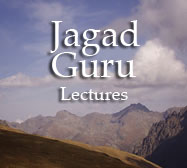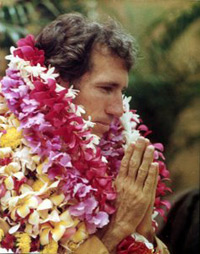Atma-Dharma, or the Propensity of the Soul, and Mental Speculation
There is a difference between the propensity to love and the propensity for sense gratification. Those who think there is sense gratification in prema-dharma should understand they are harboring a desire for sense gratification in their hearts. Atma-dharma alone is prema-dharma, or the propensity to love; mental speculation comes from the propensity for sense gratification. The eternal, pure, unmotivated love of the worshiper for the object of his worship, and the object of worship's pure love for the worshiper is called prema-dharma.
Untouchability II
THE spiritual Scriptures have declared that a human being is a higher entity than other animate and inanimate things of this world. The dignity of human life is due to the fact that it is suitable for the attainment of the service of the Absolute. No other entity of this mundane world is eligible to worship Godhead. There are beings in this world that are more intelligent, more powerful, more long-lived, and more moral, than man. The celestial beings are in all these respects superior to man. But such superiority is not of much in as much they are unfit to attain the plain of service of Godhead.
Gandhiji's Ten Questions
In various texts of the spiritual Smritis, which contain the regulations that apply to the external conduct of persons desirous of attaining the life of service of Godhead, all intimate association with persons, who are openly hostile to the Scriptures or who neglect to obey the injunctions of the Shastras commanding all persons to lead the pure (svattika) life prescribed for the Brahmanas and their dependants, is categorically forbidden. This prohibition does not include association that is strictly necessary for secular purposes in conformity with the spiritual end. Nor does it imply that any person is to be looked down upon or disrespected. Intimate association is defined as consisting of giving and taking presents, eating and feeding, hearing and telling secrets...
Untouchability
THE spiritual Scriptures have declared that a human being is a higher entity than other animate and inanimate things of this world. The dignity of human life is due to the fact that it is suitable for the attainment of the service of the Absolute. No other entity of this mundane world is eligible to worship Godhead. There are beings in this world who are more intelligent, more powerful, more long-lived, more moral, than man. The celestial beings are in all these respects superior to man. But such superiority is not of much in as much they are unfit to attain the plain of service of Godhead.
The spiritual Scriptures, however, hold out no assurance that all men will, therefore, attain to the service of Godhead. The spiritual fitness of man is only potential. Man as man has, therefore, no right to the service of Godhead. Godhead is the Absolute Master of every entity including man. There can be no right as against the Absolute. But Godhead is All-Merciful. He has declared His Will in the Scriptures that He accepts the service of man if it is offered in the spirit of sincere submission. The Scriptures also lay down the course of training by means of which true humility of the soul can be realised.
Honest Enquiry vs. Propitiation of Curiosity
Honest enquiry is one of the most essential criteria and beginning of spiritual life. 'Athatho Brahma Jijnasa' of the Brahma Sutra, 'Tasmad Gurung prapadyeta jijnasu Sreyamuttamam' of the Srimad Bhagabatam--the commentary of the Vedanta, "Tatbiddhi Pranipatena Pariprashnena Sebaya" of the Geeta and "Saddharma-spriha" of the Bhakti-rasamrita-sindhu--all these point to the necessity of honest enquiry or pariprasna at the commencement of spiritual life.
Honest enquiry is the first and foremost indication of the life of a beginner with devotional aptitude. He who is not actuated to the enquiry about Transcendence, is callous and stupefied in the matter of religion. Even the novice, in the domain of religion, becomes naturally anxious to obtain true knowledge of the spiritual Realm, as an inquisitive boy, curious to be conversant with the objects of his surrounding, puts hundreds of questions to his parents, guardians and other experienced persons at the dawn of his new life...
The Foot-Prints of the Supreme Lord
In the Temple of Jagannath at Puri there exist the Foot-Prints of Lord Sri Chaitanya on the stone floor of the room at the entrance of the Temple. The Foot-Prints of the Supreme Lord receive the heart’s worship of countless devotees every day. It is quite possible to pass this by as of no importance to any one in particular. It is also not impossible to find flaws. But are we sure that we really understand the psychology of devotion as it really is?
The fashionable philosophy of Immanence will say that Godhead is Present in everything. But will it also admit that He is specially Present in anything? Will it admit further that He has got a particular Form ‘of His Own’? It will most possibly suppose that the worship of the Foot Prints of the Supreme Lord is only a kind of devout anthropomorphism.
The Festival of the Peak of Food
The festival of the Peak of Food was celebrated in the new Buildings of the Gaudiya Math on the 22nd of October. An immense variety of the choicest kinds of food in vast quantity was offered to the supreme Lord on the occasion. The remains of the Lord’s meal were then distributed among all the people. The most well-to-do persons competed for a particle of the Mahaprasad (the great favour) on this most auspicious occasion.
The offering of the Peak of Food is essentially different both as regards its object and procedure from poor-feeding. Feeding of the poor has for its object the appeasement of hunger of those who are in want of food. This is a meritorious form of activity and has its advantages if it be considered from the point of view of the material and moral well-being of society. It is not our purpose here to go into that subject. It will suffice to observe that the object as well as the method of “feeding the poor” refer exclusively to the temporary amelioration of the physical and mental state of the persons who are fed. The relief sought and offered is limited and questionable.
The Car Festival of Sri Sri Jagannath Deva
THE Car Festival of Sri Sri Jagannath Deva was celebrated on the 28th of June. It proved to be a day of heavy rain. The devotees of Sri Purushottam Math in pursuance of the example and teaching of Sri Chaitanya Deva performed the due observance of the auspicious occasion by the chanting of Kirtan in front of the moving Car of Sri Sri Jagannath Deva. The Kirtan party was led by His Holiness Tridandi Swami Srimad Bhakti Vivek Bharati Maharaj who towered head and shoulders above the vast assemblage of pilgrims and whose moving and sonorous voice reached every ear. His Holiness sang the verses of the Chaitanya Charitamrita. These verses were made by Shri Swarup Damodar on the occasion when Shri Chaitanya Deva instituted the chant before the Car, to express the thoughts of the Lord Himself in regard to the function. The words of Swarup Goswami should be appreciated by our readers in the original in the pages of Shri Chaitanya Charitamrita. No translation can do them justice. It is my intention to submit for the sympathetic consideration of devotees certain thoughts suggested by those verses as to how Sri Chaitanya requires us to regard the Car festival.


